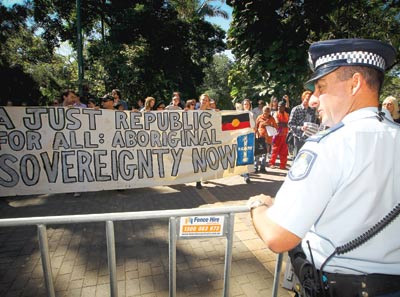Forget the courts, let’s turn to the tents

Nicole Watson The Tracker 3rd July 2012
On the evening of Invasion Day 1972 four young Koori men – Michael Anderson, Billy Craigie, Tony Coorie and Bertie Williams, created the first Aboriginal Embassy on the lawns of the federal parliament.
It says something of their combined genius that among those now replicating their actions are individuals who were not yet born in 1972.
From humble beginnings of placards and a beach umbrella, there are now Aboriginal Embassies in Western Australia, Victoria, New South Wales and Brisbane.
The response from governments to this flourishing movement has been all too familiar.
Most recently, 200 police, armed with guns and tasers, removed members of the Brisbane Aboriginal Sovereign Embassy, from the Embassy’s home of Musgrave Park.
While the television footage was distressing, it was uplifting to see the dignified responses of Aboriginal people and their supporters to such heavy handedness.
They were composed, resolute and unified.
It made me wonder, why have we invested so much in legal processes to achieve our aims?
Since the Commonwealth enacted the Native Title Act in 1994, many of our people have looked to the courts for land justice.
But in spite of enormous effort, millions of dollars and the emergence of a native title industry, the vast majority are yet to taste land justice.
Which begs the question – has it been worth it? I think not.
No doubt this will sound strange, coming from a former lawyer.
But I have reached the conclusion that grass roots political action has a number of advantages over litigation.
Firstly, such movements empower because they privilege the lived experiences of Aboriginal people and catapult them into the public domain.
As we saw most recently in Brisbane, Aboriginal people seized the opportunity to express what justice meant to them, on their own terms.
I doubt that Aboriginal people will ever be similarly empowered by the adversarial system, in which judges and lawyers exercise ultimate control over what stories are heard.
Secondly, grass roots movements are more likely to advance comprehensive platforms that present rights to land as part of a package of demands that are necessary for us to lead self-determining lives.
By way of example, the Aborigines Progressive Association’s Long Range Policy for Aborigines in 1938 demanded land together with educational opportunities and Commonwealth control of Aboriginal affairs.
Three decades later the Tent Embassy released its Five Point Policy, which made it very clear that land was indivisible from autonomy and an economic base.
Likewise, today’s Embassies are maintaining the connections between land, human rights and sovereignty.
In contrast, legal avenues force Aboriginal people to compartmentalize their goals, often dissecting land from other things necessary for us to exercise control over our lives.
Most crucially, the native title recognition process does not deal with the question of sovereignty.
Rights to education, employment and health care are similarly outside the compass of native title.
So after spending years in negotiations and court room jousts, victorious native title holders may find that the battles for services and infrastructure are far from over.
Thirdly, grass roots movements can unite our people and lay a strong foundation for national solidarity.
In contrast, the native title recognition process has proven to be divisive.
The extinguishment provisions of the Native Title Act and the onerous requirement for claimants to establish a continuous connection to their lands and waters, have divided our communities into winners and losers.
The intense pressure on our identities and the power imbalances between communities and governments, have often crystalized into family conflict.
Finally, grass roots political struggles can effectively challenge the complacency of governments and the Australian public because they have a human dimension.
Television images of the original Embassy caused many Australians to consider the question of Aboriginal dispossession for the first time.
Its close proximity to the Parliament also forced some Labor MPs to take a position on land rights.
Indeed, it was very soon after visiting the Tent Embassy that Gough Whitlam announced his commitment to land rights legislation.
No doubt, other factors were influential, but it is impossible to deny that the Embassy did have some impact on ALP policy.
Similarly, the recent eviction of members of the Brisbane Aboriginal Sovereign Embassy thrust the injustices still suffered by our people into the public domain.
Together with the predictable redneck reactions, was outrage at the over the top police operation.
In contrast, the native title recognition process is so complex and buried in layers of bureaucracy and legalese, that it lacks humanity and remains incomprehensible to most Australians.
Few have any understanding of the obstacles faced by those Aboriginal people who seek recognition of rights that have theoretically existed since our sovereignty apparently disappeared into a convenient legal fiction.
This column should not be interpreted as a criticism of great freedom fighters who have initiated legal actions, such as Eddie Mabo and John Koowarta.
We should always acknowledge the bravery and tenacity of such giants.
But I strongly believe that true power is not to be found in courts and judgments, but in the hearts of our warrior men and women.
 Nicole Watson is a Murri lawyer and researcher with the Jumbunna Indigenous House of Learning at the University of Technology, Sydney.
Nicole Watson is a Murri lawyer and researcher with the Jumbunna Indigenous House of Learning at the University of Technology, Sydney.More recent articles by Nicole: The Tracker
Top image: A police officer stands outside Queensland Parliament during a protest by members of the Brisbane Aboriginal Sovereign Embassy last month. (AAP Patrick Hamilton

